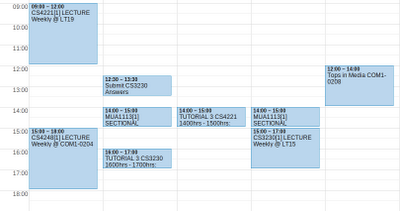Multi-tasking is not easy. Doing everything in parallel may not be efficient. It reminds of some algorithms introduced in the algorithm class like the greedy algorithm, however, the real situation is not as simple as a deadline first approach.
I'd better do some analysis here. I've got two major-requirement courses to read. One database course and one natural language processing course.
1.***The natural language processing course seems to be the most challenging among all the courses I'm taking. But I didn't spend that much time reviewing or previewing that course last week. I still don't fully understand the course yet(probably only 60-80%). I shall set it to the top priority from next week onward. (8-10h/week)
2.**The database course is fine. The topic itself is not that hard, but I shall pay more attention next week.
(5-6h/week)
3.**I read one algorithm course to enhance my algorithm analysis ability. It's not challenging, but good for logic thinking. I'd say I understand most of it(90%+),but will need to finish the tutorial 2 days earlier. (5-6h/week)
4.*Another master level course in Friday is taught by a prof specialized in music computing. Thus I choose to sit in the class occasionally.I may quit the class if not fits my interests. (0-2h/week)
5.**I've got a music production course to take as well. It's more for personal interests. I can choose not to take the grade of that course, so by right it is the least important one. But I personally love this course the most and spent quite a lot of time making my own music. I made a pop song draft last week.
Besides the courses, I am also doing two projects.
6.***One is an ebook annotation project as the final year project. (7-8h/week)
7.***Another is a hospitality related app which is an external project in an outside start-up company.These two projects are not really very time consuming. I can spend 8 hours/week for every project(That's like two nights).(7-8h/week)
8.**I self-read a machine learning course in Coursera.org which is really good. I think machine learning is really going to change the world quite a bit in the near future. It's a very interesting field. I find the course taught by Prof.Andrew Ng in Stanford very interesting,too.(3-5h/week)
9.*Some e-commerce ideas keep hanging around my mind these days. This won't occupy large blocks of time. That can be a good way of helping make good use of my spare time. (1-2h/week)
10. *bible study on Sunday 2-5pm. Although I'm not a Christian yet, I find peaceful to listen to the wisdom in Bible. (3h/week)
11. *social activities.e.g., having lunch/dinner, etc. (5h/week)
12.* entertainments, watching the voice of China TV show on Friday night+some hours in Saturday.(3-4h/week)
In total of (52-66h/week) +(50h sleep+8h bicycle as transportation and exercise)<=124h=(168-44)h. That means I will have on average additional 6hours/day of spare time, which would be more than enough to enhance the weekly tasks to a higher standard. One good approach would be to spend one more hour on the particular tasks before/after the tasks begin/end. That is to extend the time interval.
Then I realize there is no excuse of saying that someone has got too many things to do and cannot do them well.The reason I feel busy is not that I've got no time, but that I can better manage my time.
Conclusion: The more time you would be spending on a task, the higher priority this task is.

I like what I see. Keep up the good work! :-)
ReplyDeleteThanks, Prof.Ben.
Delete